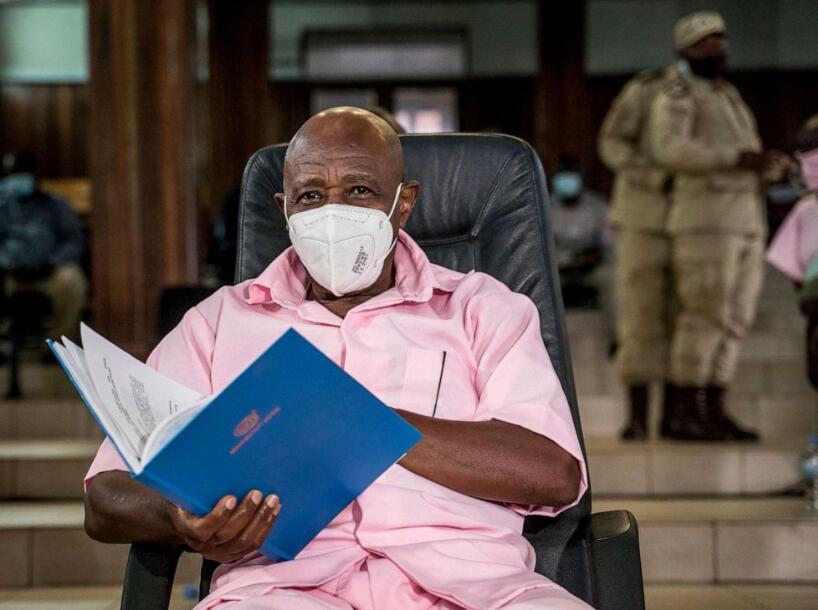The man who inspired a Hollywood movie has been detained since 2020.
LONDON — The Rwandan government announced Friday that Paul Rusesabagina, who inspired the acclaimed 2004 film “Hotel Rwanda,” will be released from prison nearly three years after he was captured and detained.
The 68-year-old Rwandan hotelier-turned-dissident, who is a lawful permanent resident of the United States, was tried and convicted on a slew of terrorism-related charges in Rwanda’s High Court in Kigali in 2021. He was sentenced to 25 years behind bars.
Rusesabagina’s prison sentence was commuted by presidential order on Friday after consideration of his request for clemency and approval by the Cabinet, according to Rwandan Minister for Justice and Attorney General Emmanuel Ugirashebuja
“Under Rwandan law, commutation of sentence does not extinguish the underlying conviction,” Ugirashebuja said in a statement. “If any individual benefitting from early release repeats offences of a similar nature, the commutation can be revoked and the remainder of the prison sentence will be served, in accordance with the conditions specified in the Presidential Order. Other penalties imposed by the Court, such as compensation owed to victims, are not affected by this commutation and thus remain in force.”
A Rwandan government spokesperson confirmed to ABC News that Rusesabagina would be freed within 24 hours.
When asked for comment, Rusesabagina’s family told ABC News in a statement on Friday: “We are pleased to hear the news about Paul’s release. The family is hopeful to reunite with him soon.”
President Joe Biden in a written statement welcomed the release of Rusesabagina, thanking the Rwandan and Qatari governments as well as those in the U.S. government who worked to free him.
“I thank the Rwandan Government for making this reunion possible, and I also thank the Government of Qatar for facilitating Paul’s release and return to the United States,” Biden said. “I add my gratitude to those across the U.S. Government who have worked with the Government of Rwanda to achieve today’s happy outcome.”
Last year, the U.S. Department of State determined that Rusesabagina, who has maintained his innocence, had been “wrongfully detained.” The U.S. House of Representatives subsequently passed a bipartisan resolution calling on the Biden administration to demand Rusesabagina’s release on humanitarian grounds. As U.S. Secretary of State Antony Blinken traveled to Rwanda in August 2022, members of Congress sent a letter urging him to push for Rusesabagina’s “immediate release” and “safe return to the United States.”
Rusesabagina was the manager of the Hotel des Mille Collines in Kigali during the Rwandan genocide of 1994, when divisions between Rwanda’s two main ethnic groups came to a head. The Rwandan government, controlled by extremist members of the Hutu ethnic majority, launched a systemic campaign with its allied Hutu militias to wipe out the Tutsi ethnic minority, slaughtering more than 800,000 people over the course of 100 days, mostly Tutsis and the moderate Hutus who tried to protect them, according to estimates from the United Nations.
More than 1,200 people took shelter in the Hotel des Mille Collines during what is often described as the darkest chapter of Rwanda’s history. Rusesabagina, who is of both Hutu and Tutsi descent, said he used his job and connections with the Hutu elite to protect the hotel’s guests from massacre. The events were later immortalized in “Hotel Rwanda,” with American actor Don Cheadle’s portrayal of Rusesabagina earning an Academy Award nomination for best actor in 2005.
Rusesabagina, who fled Rwanda with his family in 1996 and later settled in San Antonio, Texas, rose to fame and was lauded as a hero after the movie’s release. In 2005, he was awarded the U.S. Presidential Medal of Freedom, the highest civilian honor given by the American president. He also wrote a book, gave paid speeches and became an outspoken critic of Rwandan President Paul Kagame, who has been in office for the last two decades.
In August 2020, Rusesabagina traveled to Dubai to meet up with a Burundi-born pastor who Rusesabagina alleges had invited him to speak at churches in Burundi about his experience during the Rwandan genocide. The pair hopped on a private jet that Rusesabagina believed would take them to Burundi’s capital, according to Rusesabagina’s international legal team.
Rusesabagina did not know that the pastor was working as an informant for the Rwanda Investigation Bureau and had tricked him into boarding a chartered flight to Kigali. He was subsequently arrested and charged with several terrorism-related offenses, with Rwandan prosecutors alleging that Rusesabagina wanted to go to Burundi to coordinate with rebel groups based there and in the neighboring Democratic Republic of the Congo.
Rusesabagina’s family and lawyers have repeatedly expressed concern over his condition and treatment while under detention in Rwanda’s capital. The married father of six is a cancer survivor and is prescribed medication for a heart disorder. He was held in solitary confinement for more than eight months after his capture and has been denied proper medical care, according to his international legal team. The U.N.’s Nelson Mandela Rules state that keeping someone in solitary confinement for more than 15 consecutive days is torture.
